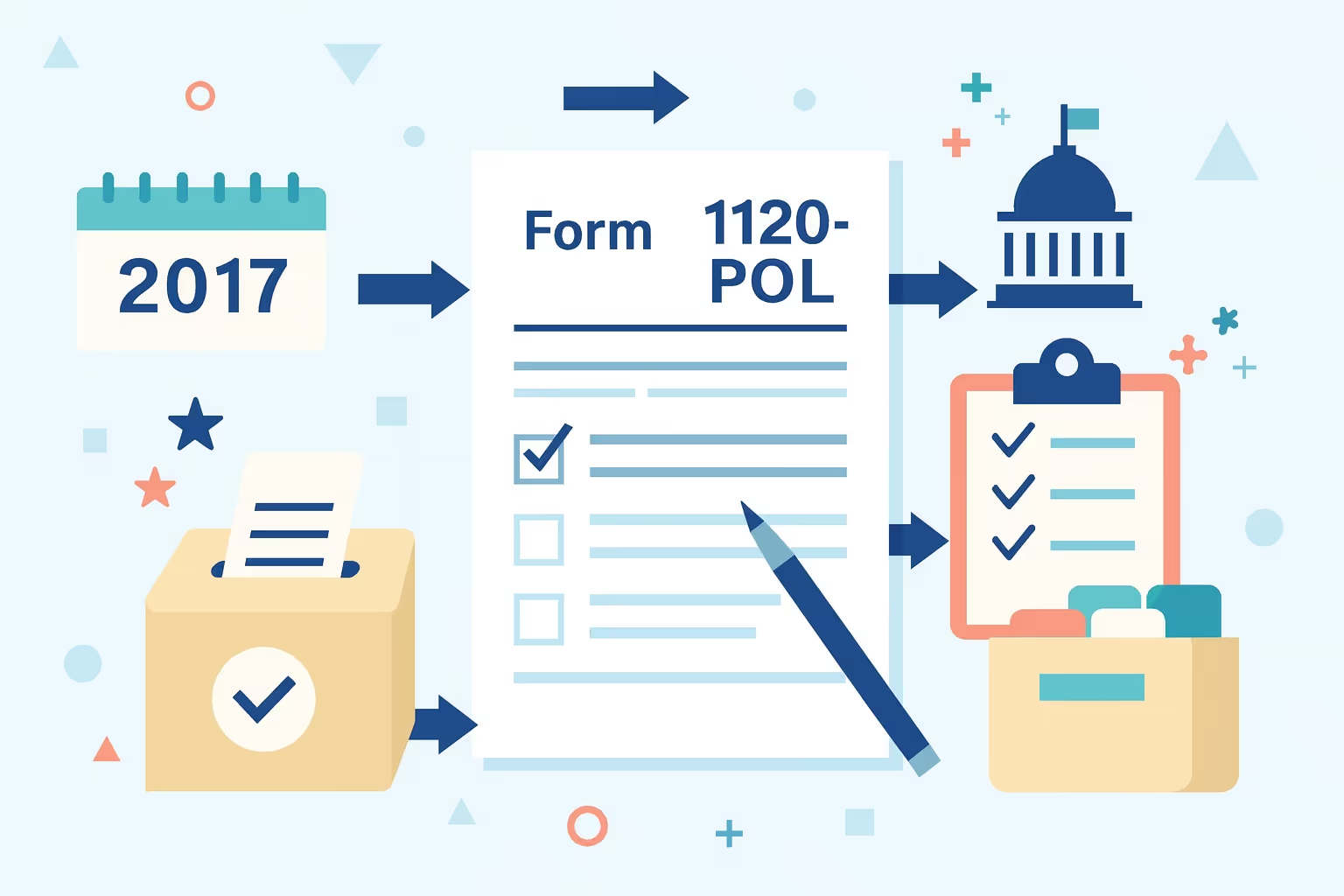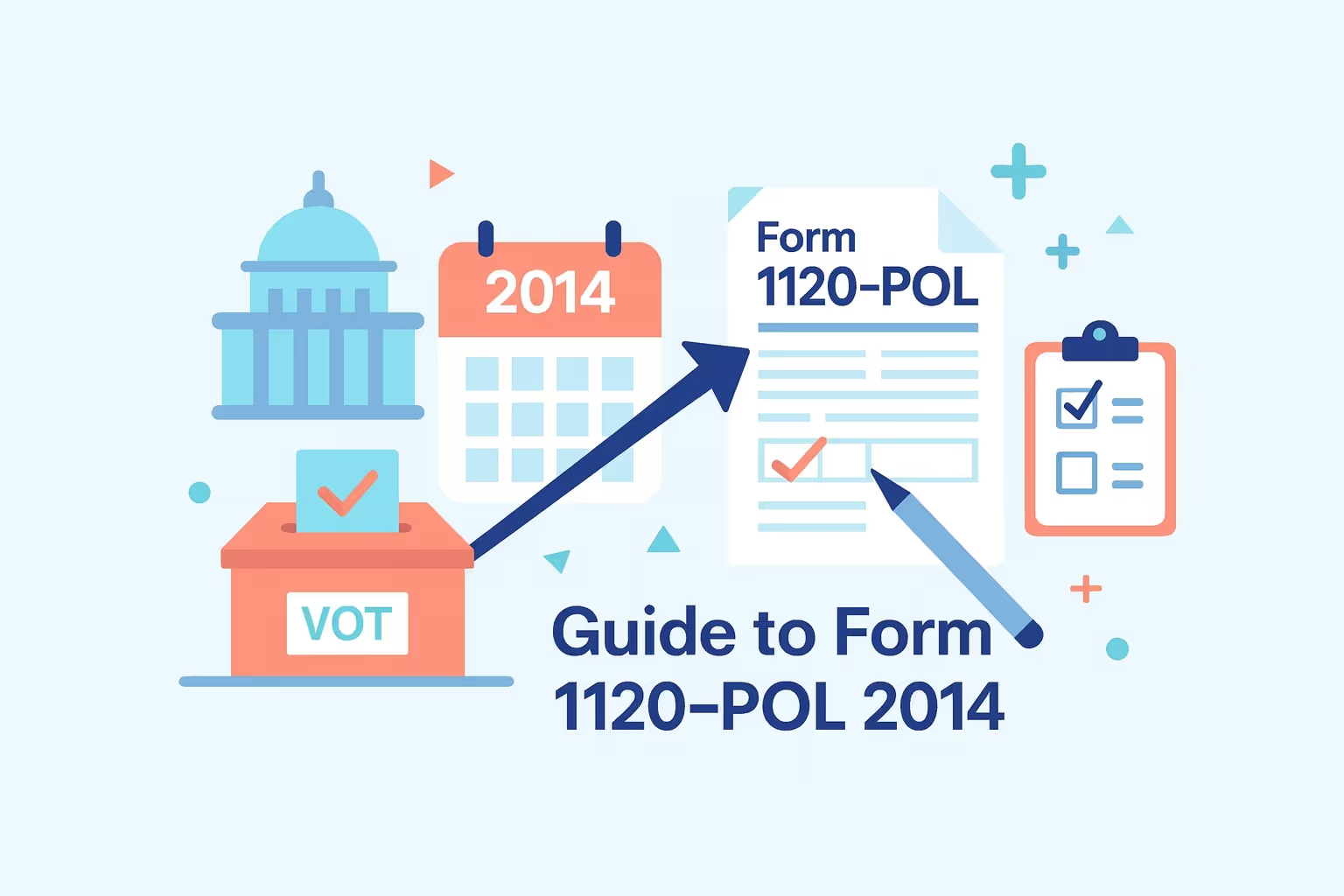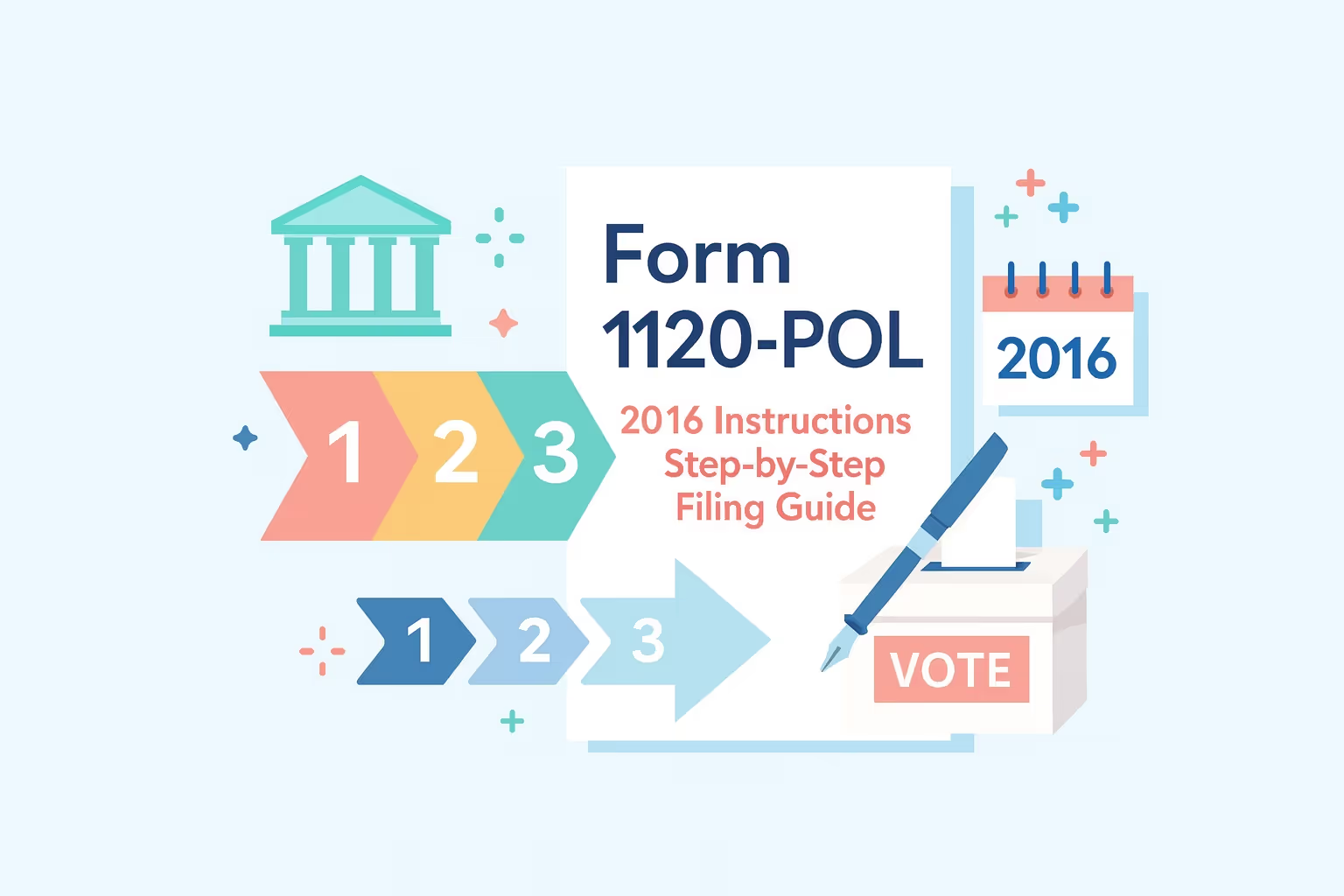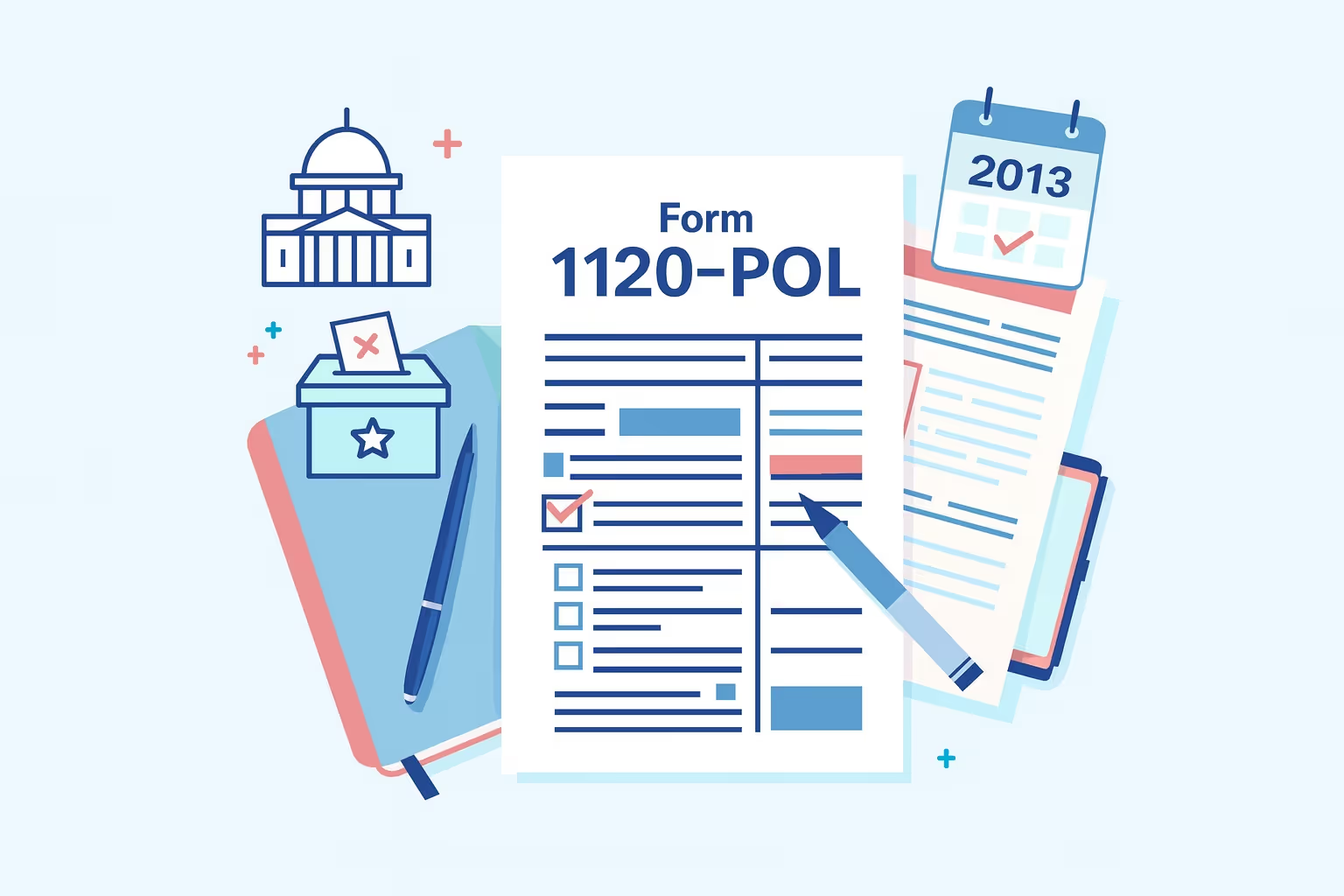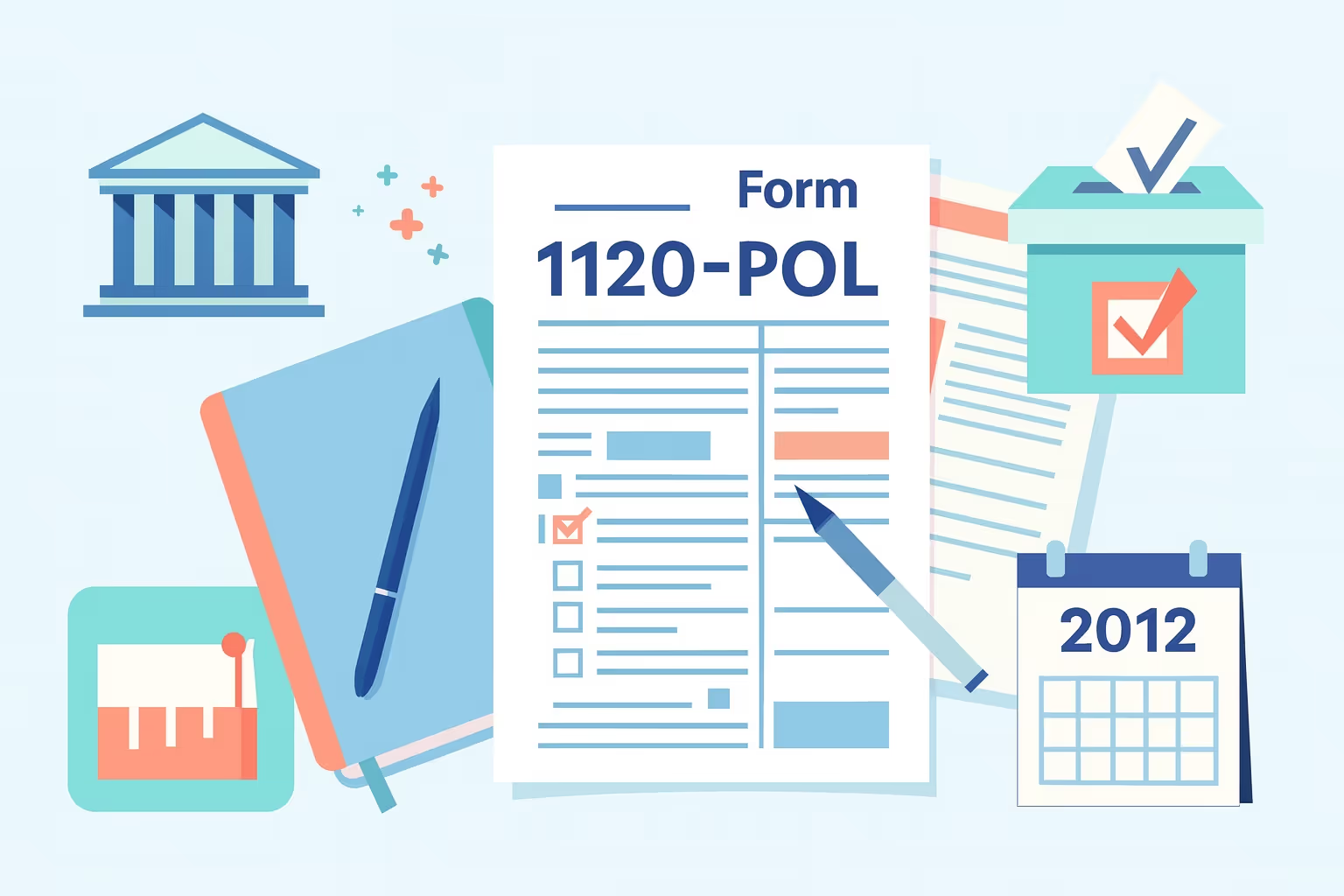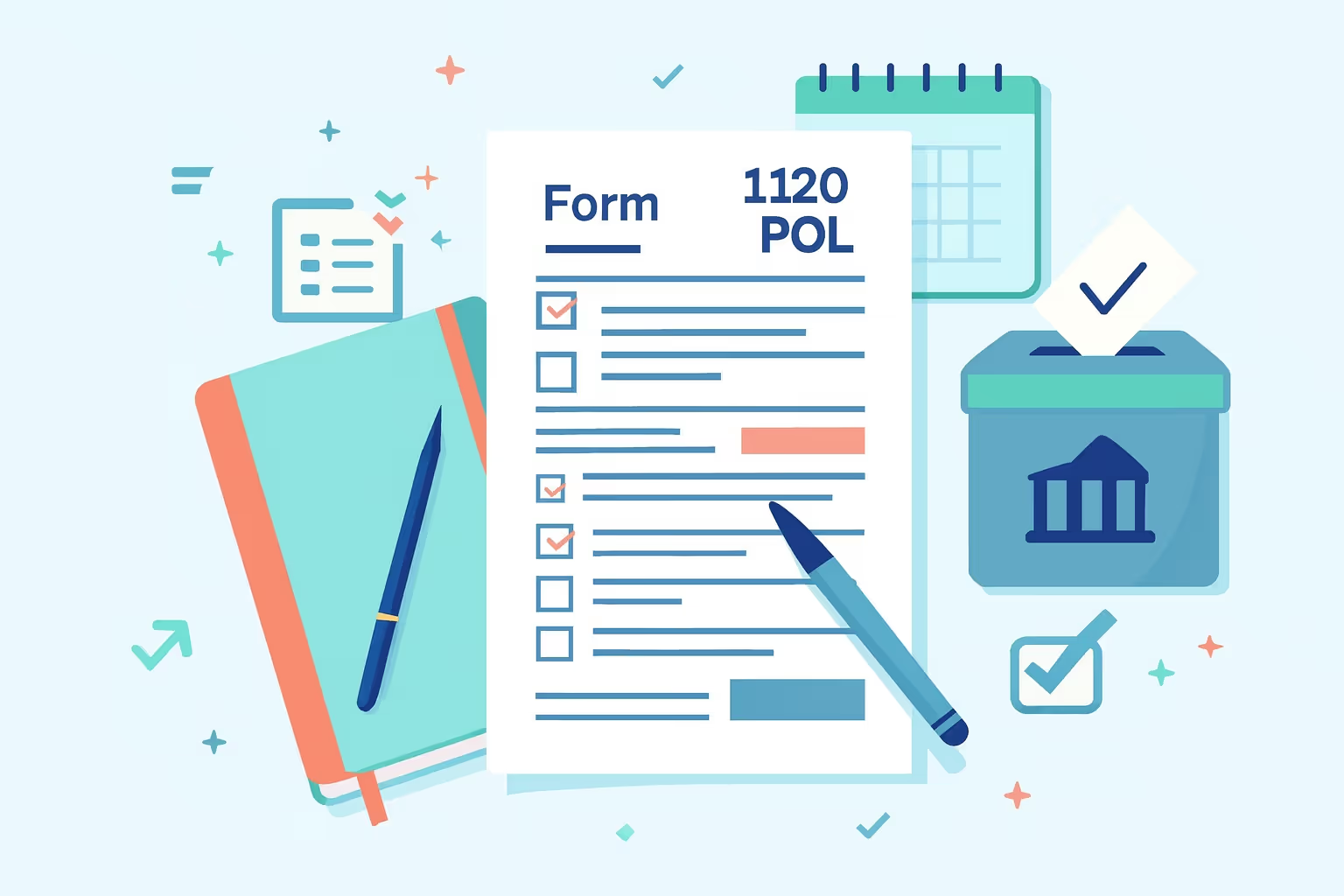
Political organizations face unique federal requirements when preparing their annual income tax return. For tax year 2015, the Internal Revenue Service (IRS) required certain political organizations to file Form 1120-POL when they had political organization taxable income. This form ensures compliance with the Internal Revenue Code and establishes accurate reporting of both taxable income and related deductions.
Not every exempt political organization must file, but the rules under Section 527 apply broadly. When a political organization has taxable income, the IRS requires a filing form to calculate tax liability. This includes income from investments, rents, royalties, and other sources unrelated to exempt function expenditures. Understanding who must file and which income is subject to tax is critical.
This guide explains the form, outlines essential details for political organizations, and highlights important steps. By following the official Form 1120-POL 2015 instructions, organizations can complete the process correctly, avoid penalties, and comply with federal law. The following sections detail the requirements, deadlines, and filing methods.
Overview of Form 1120-POL 2015 Instructions
Form 1120-POL is the U.S. Income Tax Return for Certain Political Organizations. It applies to organizations that have taxable income beyond exempt function income.
What is Form 1120-POL?
Form 1120-POL is a federal tax form that political organizations use to report their taxable income and calculate their income tax liability under the Internal Revenue Code.
Who Must File Form 1120-POL?
- Political organizations: These include campaign committees, parties, associations, and other groups organized to influence elections that generate taxable income.
- Exempt organizations: Certain Section 501(c) organizations may need to file when subject to Section 527(f)(1) rules on taxable political income.
What Income is Taxable?
- Investment income: This income includes dividends, interest, rents, royalties, and gains from capital assets or qualified investments.
- Other sources, such as trade or business income, improperly segregated exempt funds, or contributions reclassified as taxable due to a material change, are taxable income.
- Failure to file notice: If the political organization's notice Form 8871 was not filed on time, exempt function income becomes taxable.
Filing Form 1120-POL: Key Details
Political organizations must understand which rules were applied in 2015 and how the IRS requires them to file income tax returns.
Filing Threshold and Requirement
- $100 rule: If taxable income exceeds $100 after deductions, certain political organizations must file Form 1120-POL with the IRS.
- Annual gross receipts: Organizations with significant receipts may also have additional information reporting obligations through other IRS forms.
Employer Identification Number (EIN)
- Required identification: All organizations must include a valid employer identification number on the form to ensure it is accepted.
- Records relating to the filing form: EIN ensures that records relating to the filing form are processed correctly at the Internal Revenue Service Center.
Organizational Types
- Principal campaign committees: Congressional campaign committees must complete the return for taxable income under special corporate tax rate rules.
- Newsletter funds: Special restrictions apply to newsletter funds, which cannot claim the $100 specific deduction under the Internal Revenue Code.
Income Tax Return Due Date and Deadlines
Understanding the 2015 filing timeline is essential because penalties apply when returns are filed late or are incomplete.
Standard Due Date
- Calendar year organizations: Returns were due March 15, 2016, for organizations operating on a calendar tax year basis.
- Fiscal year filers: Returns were due by the 15th day of the third month following the end of the fiscal year.
Extensions
- Form 7004: Organizations could request an automatic six-month extension to file, but this extension applied only to the return, not the tax payment.
- Payment requirement: Even with an extension, organizations had to pay estimated tax by the original due date to avoid minimum penalty charges.
Step-by-Step Guide to File Form 1120-POL
Use this sequence to file Form 1120-POL for the 2015 tax year. It applies to certain political organizations preparing an income tax return. Follow each step carefully so the Internal Revenue Service can process the form accurately and on time.
Step 1: Gather Required Information
Assemble bank statements, investment reports, annual statements, and detailed records relating to contributions and expenditures. Retrieve the prior-year return, employer identification number, and any Form 8871 confirmation. Identify needed schedules, including Schedule D, Form 4797, and Form 4562. Confirm the responsible officers, mailing address, and contact details for questions.
Step 2: Complete Header Information
Enter the organization name, address, and employer identification number exactly as on IRS records. Select calendar year 2015 or the fiscal year dates. Check applicable boxes for original return, amended return, name or address change, final return, and principal campaign committee. Provide accurate contact information to avoid correspondence delays and processing errors.
Step 3: Report Income on Lines 1–8
Report dividends, interest, gross rents, and gross royalties. Include capital gains on Schedule D and gains or losses from business property on Form 4797. Disclose other income such as trade or business receipts, partnership Schedule K-1 amounts, or improperly segregated exempt function income. Include income taxable due to the late filing of Form 8871.
Step 4: Enter Deductions on Lines 9–16
Claim only deductions directly connected to producing taxable income. Report salaries and wages, rents, repairs, taxes, and interest. Include depreciation using Form 4562 where required. Itemize other deductions with a clear description and business purpose statement. Maintain documentation supporting every amount to meet Internal Revenue Service substantiation standards during review.
Step 5: Calculate Taxable Income
Subtract total deductions on line 16 from total income on line 8. For Section 501(c) organizations, complete lines 17a and 17b before entering line 17c. Reduce the result by the $100 specific deduction on line 18, except for newsletter funds. Enter the remaining amount as taxable income on line 19.
Step 6: Determine Tax Liability on Lines 20–22
Compute income tax on line 20 using the 35 percent flat rate, unless the filer qualifies as a principal campaign committee using corporate rates. Apply allowable credits, such as the foreign tax credit or general business credit, on line 21. Calculate total tax on line 22 after subtracting credits from the computed tax.
Step 7: Report Payments and Balance Due
Enter deposits made with Form 7004 extensions, credit for tax on undistributed capital gains, and any fuel credits from Form 4136—total payments on line 23d. If line 22 exceeds line 23d, report the tax due on line 24. If costs exceed tax, report the overpayment on line 25 and select refund or credit.
How to File Form 1120-POL: Filing Methods and Process
In 2015, filing methods included both paper and electronic options. Political organizations needed to ensure the form was properly transmitted to the Internal Revenue Service Center.
Paper Filing
- Mailing address: Domestic filers used the IRS Ogden, Utah, internal revenue service center address for submitting their income tax return.
- Foreign country filers: Organizations located abroad used the international filing address designated by the IRS for tax returns.
E-File Option
- Electronic transmission: Organizations could file Form 1120-POL for faster processing, fewer errors, and quicker confirmation that the form was accepted.
- Rejected returns: Entities could retransmit rejected returns electronically if errors occurred, provided the corrected form was resubmitted before the due date.
Private Delivery Services
- Approved services: FedEx and UPS were authorized to deliver filing form submissions, but these carriers could not deliver to post office boxes.
- Important note: Use only IRS-approved delivery methods to ensure the form is filed on the correct date.
Payment Instructions for Income Tax Liability
Political organizations must pay their tax liability using approved federal methods. Payments must be timely to avoid penalties and interest.
Electronic Federal Tax Payment System (EFTPS)
- Mandatory deposits: Federal tax deposits had to be made electronically through EFTPS for accuracy and secure processing of money owed.
- Deadline rules: EFTPS payments had to be scheduled by 8 p.m. Eastern Time on the business day before the due date.
Same-Day Payment Options
- Wire transfer methods: Organizations that need to make last-minute payments could use the Federal Tax Application system to pay through their bank.
- Financial institution role: Each bank sets its cutoff times and fees, so organizations must confirm details before scheduling payment.
Installment Agreements
- Eligibility criteria: Installment plans were available if the total balance was $25,000 or less and could be paid within 24 months.
- Application method: Apply through the IRS website using the online payment agreement tool, but interest and penalties continued to accrue during the agreement.
Schedules and Attachments Required
The Internal Revenue Code requires additional schedules and forms when certain income or deductions are reported on Form 1120-POL.
Mandatory Attachments
- Schedule D: If the organization reports capital gains or losses from investments or property sales, it must include Schedule D.
- Form 4797: The organization must include Form 4797 when it reports business property sales or exchanges on the income tax return.
- Form 4562: The organization must include Form 4562 when it claims depreciation deductions associated with income-producing property.
Required Statements
- Dividend statement: The return must include a breakdown of each dividend source, the amount, and the date received when reporting dividend income.
- Other deductions: The return must include a statement that lists each expense, the amount, and how it relates directly to producing taxable income.
- Other income: The filer must explain each additional income source and why it is included in taxable income.
Congressional Candidate Requirements
- Principal committees: Principal campaign committees must attach Federal Election Commission documentation that confirms the committee’s principal designation.
- Information required: The submission must include candidate information, district, office sought, party affiliation, and committee details with the annual return.
Common Mistakes When Filing Form 1120-POL
Errors often delay processing or increase tax liability. Avoiding these issues ensures compliance and reduces the risk of penalties.
Filing Errors
- Failure to file: Political organizations that fail to file Form 1120-POL when required face minimum penalty charges and interest on unpaid tax.
- Misclassification of income: The organization may distort tax liability calculations by improperly including exempt function contributions as taxable income.
- Incorrect deduction claims: The organization may only claim deductions directly connected to taxable income and must exclude unrelated expenses.
Documentation Errors
- Missing EIN: Every return must include a valid employer identification number to be accepted by the IRS.
- Incomplete records: Organizations must retain records relating to income, deductions, and expenditures to comply with IRS requirements.
- Unsigned returns: An unsigned original return will not be considered filed, which results in IRS rejection and potential penalties.
Payment Errors
- Improper payment method: Payments should not accompany paper tax forms, and all deposits must go through EFTPS to be considered timely.
- Missed deadlines: Payments scheduled after the due date can trigger penalties and cause the organization to lose compliance history.
Special Situations for Certain Political Organizations
Some political organizations face unique rules when filing Form 1120-POL 2015 instructions. These rules apply in cases involving campaign committees, newsletter funds, and exempt organizations with unusual circumstances.
Principal Campaign Committees
- Corporate rates: Principal campaign committees computed tax liability using corporate rates instead of the 35 percent flat rate.
- Documentation requirement: These committees had to submit candidate information, office sought, party affiliation, and committee data with the income tax return.
Newsletter Funds
- Deduction limitation: Newsletter funds could not claim the $100 specific deduction allowed for other political organizations, increasing their taxable income.
- Special restrictions: These organizations remained subject to additional information reporting under the Internal Revenue Code, including annual gross receipts monitoring.
Exempt Political Organization With Zero Activity
- Optional filing: Organizations with no taxable income may still file Form 1120-POL to establish a compliance history.
- Benefits of filing: Filing helps start the statute of limitations period and avoids potential future questions about missing tax returns.
Compliance and Risk Management
Maintaining compliance helps political organizations avoid penalties and protect their tax-exempt status. The IRS provides guidance to reduce risk when filing Form 1120-POL.
Recordkeeping
- Records relating: Organizations must maintain detailed records of income, deductions, expenditures, and contributions reported in their annual returns.
- Retention requirement: Generally, records should be kept for at least three years after filing the original return with the IRS.
Internal Audit Practices
- Self-checks: Conducting an internal audit before filing helps identify errors in tax forms and ensures instructions are followed correctly.
- Consistency: An internal audit confirms that the political organization's report matches the official tax return filed with the Internal Revenue Service.
Avoiding Penalties
- Minimum penalty: A minimum penalty can be assessed for late or incomplete filings, even if there is little or no tax liability.
- Extension option: Filing Form 7004 can grant an extension, but estimated tax must still be paid by the original due date.
After You File Form 1120-POL
After filing Form 1120-POL, political organizations must take certain steps. These include monitoring for IRS notices, handling refunds, and preparing amended returns when necessary.
IRS Response and Refunds
- Refund eligibility: Overpayments appear on line 25, and organizations may claim refunds once the IRS processes the income tax return.
- Processing time: Refunds are faster when organizations e-file and use direct deposit rather than paper forms and mailed checks.
Amended Return Procedures
- When needed: An amended return is filed when errors are discovered after submission, such as omitted income or deduction misstatements.
- How to file: Organizations must check the amended return box, complete a new form, and attach a clear explanation of all changes.
Ongoing Compliance
- Annual statement obligations: Certain political organizations must file additional IRS forms, including Form 8871 and 8872, to comply with disclosure rules.
- Future planning: Organizations should plan for upcoming calendar tax year obligations and monitor the IRS website updates for material change guidance.
Frequently Asked Questions
Do all political organizations need to file Form 1120-POL?
No, only certain political organizations with political organization taxable income must file. If taxable income after deductions exceeds $100, the organization must submit Form 1120-POL to the Internal Revenue Service Center. Even exempt political organizations may have to file when Section 527(f)(1) rules apply. Filing ensures compliance with the Internal Revenue Law and avoids penalties.
What income is taxable for political organizations?
Taxable income includes investment earnings, rental income, royalties, trade or business income, and improperly segregated contributions. When a political organization notices Form 8871 was not filed on time, even exempt function income becomes taxable. Under internal revenue law, organizations must carefully determine what qualifies as taxable income and accurately report all income tax returns.
What is the due date for filing Form 1120-POL for 2015?
For organizations on a calendar year, the due date was March 15, 2016. Fiscal year filers had to submit by the 15th day of the third month after year-end. An extension was available by filing Form 7004, but taxes owed still had to be paid by the original due date to avoid penalties.
Can Form 1120-POL be filed electronically?
Yes, organizations could e-file Form 1120-POL for faster processing. Electronic filing reduces errors, provides quicker IRS confirmation, and ensures the form is accepted. If errors occur, organizations can retransmit rejected returns before the due date. E-filing is generally encouraged, as it provides better accuracy and more efficient tax return processing than paper filing.
What should an organization do if an error is found after filing?
The organization must file an amended return. This requires completing a new Form 1120-POL, checking the amended return box, and attaching a detailed explanation of all corrections. Organizations must ensure all figures are accurate and consistent with records relating to the tax year. Filing an amended return maintains compliance with IRS instructions and prevents additional penalties.
How long should organizations keep tax records?
Organizations must keep records relating to the income tax return for at least three years after filing the original return. Records should include income statements, expenditures, contributions, and deductions reported. In cases where an amended return was filed, organizations should keep documentation longer. Good recordkeeping supports compliance, reduces audit risk, and ensures future nonprofit tax filing accuracy.
What happens if a political organization cannot pay its tax liability?
Organizations unable to pay the full balance may apply for an installment agreement through the IRS website. Installment plans are available if the liability is $25,000 or less and is payable within 24 months. While agreements allow flexibility, interest and penalties continue until full payment. Applying before the due date prevents additional penalties and preserves compliance history.












